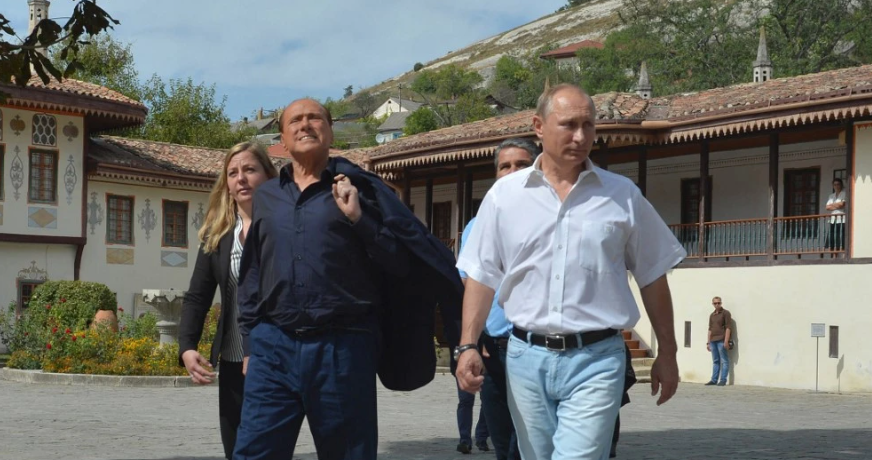In 2013 Vladimir Putin invited Silvio Berlusconi, the former Prime Minister of Italy, to Russia on a hunting trip. When Berlusconi returned, he confided some unsettling details of his trip to his spokesman Paolo Bonaiuti and Fabrizio Cicchitto, who at the time was the leader of Berlusconi’s Forza Italia party in the Chamber of Deputies, Italy’s lower house of parliament.
On May 5, Italian newspaper Corriere della Sera published an interview with Cicchitto, in which he recounted Berlusconi’s impressions of hunting with Putin, as well as the friendship between the two leaders.
It was an episode that shook Berlusconi’s certainties, Cicchitto said, because, as Berlusconi described it upon his return to Italy, “Vladimir showed me a violent nature that I couldn’t imagine in such a kind and rational man.”
Berlusconi, who had often boasted about his intimate friendship with the Russian dictator, did not expect such a warm welcome.
The former prime minister said to Bonaiuti and Cicchitto: “Putin told me: ‘Silvio, let’s go hunting.’ I thought, ‘Hunting? I’ve even never touched a rifle.’ But he insisted, so I accompanied him. When we got to the woods, he gave me a rifle. I became anxious. As we walked through the snow, he saw two deer and motioned for me to aim at one: ‘That one is yours. Shoot.’”
Berlusconi made him understand that he was unable to kill a deer. “Even if I died, I wouldn’t have shot,” he said.
“Then Putin shot them both and killed them. He looked at me with satisfaction: ‘Today I will offer you extraordinary food.’ He went down the slope toward the deer, holding a knife. He cut open one of the beasts and took out its heart. Then he had one of his bodyguards give him a wooden tray, which he gave to me, and put that piece of bloody meat on it: ‘It will make an exceptional meal.’”
Berlusconi added: “I nearly had a stroke. I hid behind a tree and vomited.”
Cicchitto said that the silence after the story lasted for a few interminable seconds until Berlusconi commented: “Maybe it’s just a hunter’s custom.”
Analyzing the bromance
When questioned about the nature of Berlusconi’s friendship with Putin, Cicchitto, who was then one of Berlusconi’s closest political interlocutors, described it as “a bond of psychological homosexuality.”
He added: “They admired each other and theirs was an absolutely equal relationship. Putin considered this Italian entrepreneur who controlled TV and had managed to break into politics to be brilliant. In turn, Berlusconi considered him a pragmatist, capable of managing a country like Russia and with whom you could do many things together: from business to women. Silvio had the ambition to bring him into the West and NATO. ‘I’ll go down in history,’ he said. He thought he would win, but instead he got screwed by Putin.”
Cicchitto assessed, along with Berlusconi, that Putin wanted to gain a more important role on the world stage: “He wanted to get back into the Great Game. And he used Berlusconi and his relations with the Americans to return to the exclusive parlor from which Russia had been expelled after the end of the Soviet Union.”
Berlusconi felt that he could influence Putin, especially after he helped restrain the Russian leader after the 2008 invasion of Georgia.
Berlusconi and Ukraine
So, after the invasion of Ukraine, Cicchitto said, “Berlusconi was disappointed. Even if he was mad at Zelensky, whom he defined as ‘a megalomaniacal actor, dangerous to himself and others.’”
In fact, shortly before Berlusconi’s death in 2023, he publicly stated that he understood Putin’s attempt to replace the Ukrainian president with “decent people” and blamed Zelensky for the war.
Cicchitto also said: “I was told that recently Berlusconi claimed that he would never have voted in favor of Kyiv’s entry into the EU and NATO. But our contacts by then had become rare.”
He felt that Berlusconi was completely ignorant of Putin’s cultural background, which had Peter the Great, Ivan the Terrible and Joseph Stalin as points of reference.
“Each of these characters had a very strong authoritarian component, linked not to the restoration of the Soviet Union but to the myth of Great Russia,” Cicchitto said.
“I had the privilege of meeting the greatest Italian Slavic scholar, Vittorio Strada, who explained to me the complexity of the Russian president and his ideological approach. Putin was the first to understand that politics could be done through the internet, which could be used to penetrate the system of liberal democracies he despises, to manipulate it… He has always aimed to destabilize the West. But Berlusconi glossed over certain issues. As prime minister he was interested in completing his political operation…”
Cicchitto also writes that “a large part of the West supported the idea that Putin was the head of the KGB with whom they could also do business.”
He added, “And while this was happening, Putin invaded Europe through his oligarchs, buying football teams, newspapers, and parties. Nobody wanted to see the dark side of the moon. Berlusconi didn’t and neither did [former Italian Prime Minister Romano] Prodi, the former German Chancellor Gerhard Schröder, the former German Chancellor Angela Merkel… Shall I continue? Everyone in the West believed Putin could be an ally.”
kyivpost



















